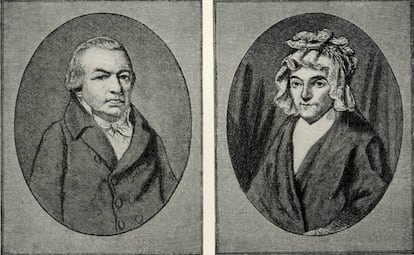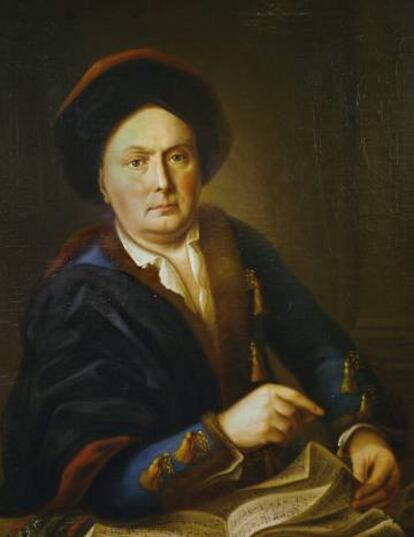Beethoven’s Spanish grandmother
A new book explores the influence that María Josefa Poll had on the musical genius from Germany


It was no coincidence that his neighbors in Vienna knew him as “The Spaniard.” His dark complexion, short stature compared with the average Germanic type, and a turbulent temperament all contributed to the moniker.
But the main reason for Ludwig Van Beethoven’s “Spanishness” was in his genes. His maternal grandmother, María Josefa Poll, was either born south of the Pyrenees herself, or else descended from a Spanish family who undertook the journey north during the War of Spanish Succession (1701-1714).
The issue is still up for debate, and German biographers are disinclined to give it importance. Jan Swafford, author of the last work of reference about the composer’s life, does mention her, but without specifying her place of origin.

But two American scholars, the historian David Jacobs and Harvard professor Elliot Forbes, did delve into the grandmother’s origins, and concluded that she was specifically from eastern Spain. Their findings are mentioned in a new book by the musicologist Andrés Ruiz Tarazona.
“The Germans did not want to cross their genius with Spanish forebears, but Americans have done just that, and we [Spaniards] haven’t cared very much either way. But it’s important, and I want to underscore it,” says Tarazona, whose book España en los grandes músicos (or, Spain in the great musicians) devotes a chapter to Beethoven.
Besides his family ties to Spain, “there was also the constant interest he showed in news coming out of the south.” Beethoven was apparently overjoyed at news of Napoleon’s defeat in Spain in 1814. By then his Symphony No. 3, the Heroic Symphony, was no longer dedicated to Bonaparte: Beethoven was unhappy about the way that the French leader had forgotten the principles of the Revolution to satisfy his own imperial urges.
Hardly any information about his maternal grandmother has survived. In 1733 she married Ludwig van Beethoven I in Bonn. A musician himself, Beethoven’s grandfather was a bass singer at the Cologne court choir and was later appointed Kapellmeister. But it was hard to make a living from music alone, so he also ran a wine business.
Perhaps it was the proximity to the product, or a feeling of being uprooted, but in any event, María Josefa became fond of wine. She ended her days at a clinic, a certified alcoholic. Before that she had given birth to Johann, the genius’ father.
The Del Río family helped Beethoven deal with his own dark moods
All of this helps explain Beethoven’s fondness for Spain, the fact that Fidelio, his only opera, is set in Seville; and his decision to enroll his nephew Karl in a Spanish school founded in Vienna by Cayetano Anastasio del Río, a tutor for several aristocratic families in the city.
Del Río forged a strong friendship with Beethoven, and so did his daughters Fanny and Nanni. Fanny’s surviving diaries have provided crucial details about the musician’s life, financial difficulties, health problems and his troubled relationship with his nephew.
Having no children of his own, Beethoven fought for custody of Karl when his own brother died, and he became a devoted guardian – often in an overbearing way. Meanwhile, Fanny was madly in love with the musician, and the pair became emotionally close even though Beethoven did not share the same feelings of love. In fact, he seemed more interested in her sister. But beautiful Nanni was beyond Beethoven’s reach, and gently rebuffed his every advance.
The Del Río family helped Beethoven make the best of his anguish, his dark moods and his chronic ill health, made worse by bouts of flu, stomach troubles, constant headaches and fits of melancholy. But he never returned the affection that he received from Fanny, who adored him in a way very few other people ever did.
English version by Susana Urra.
Tu suscripción se está usando en otro dispositivo
¿Quieres añadir otro usuario a tu suscripción?
Si continúas leyendo en este dispositivo, no se podrá leer en el otro.
FlechaTu suscripción se está usando en otro dispositivo y solo puedes acceder a EL PAÍS desde un dispositivo a la vez.
Si quieres compartir tu cuenta, cambia tu suscripción a la modalidad Premium, así podrás añadir otro usuario. Cada uno accederá con su propia cuenta de email, lo que os permitirá personalizar vuestra experiencia en EL PAÍS.
¿Tienes una suscripción de empresa? Accede aquí para contratar más cuentas.
En el caso de no saber quién está usando tu cuenta, te recomendamos cambiar tu contraseña aquí.
Si decides continuar compartiendo tu cuenta, este mensaje se mostrará en tu dispositivo y en el de la otra persona que está usando tu cuenta de forma indefinida, afectando a tu experiencia de lectura. Puedes consultar aquí los términos y condiciones de la suscripción digital.








































